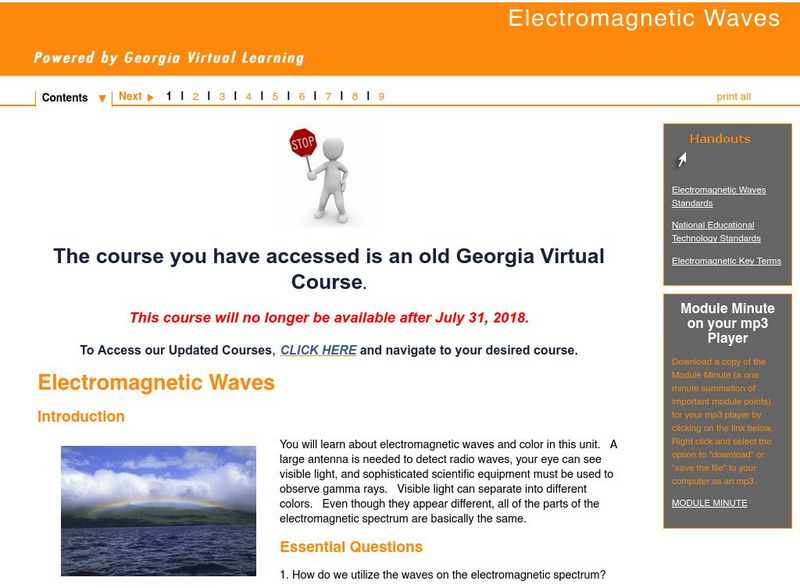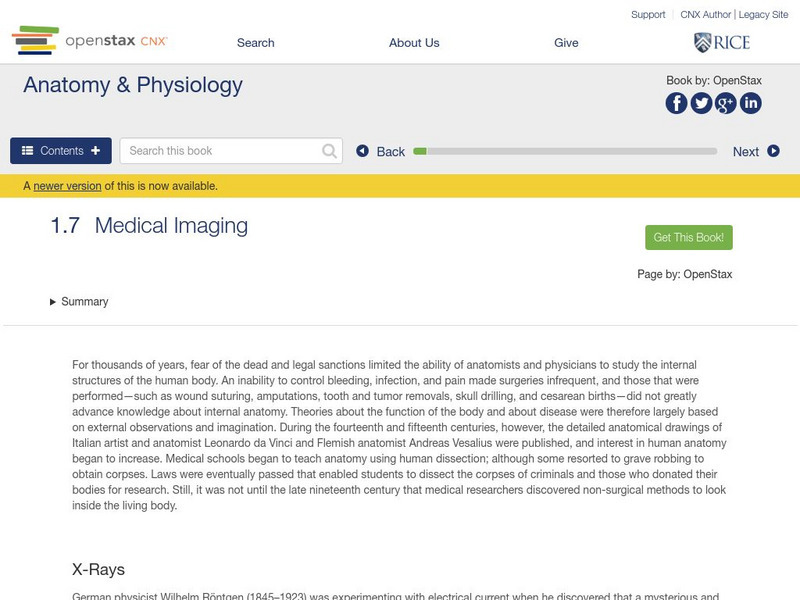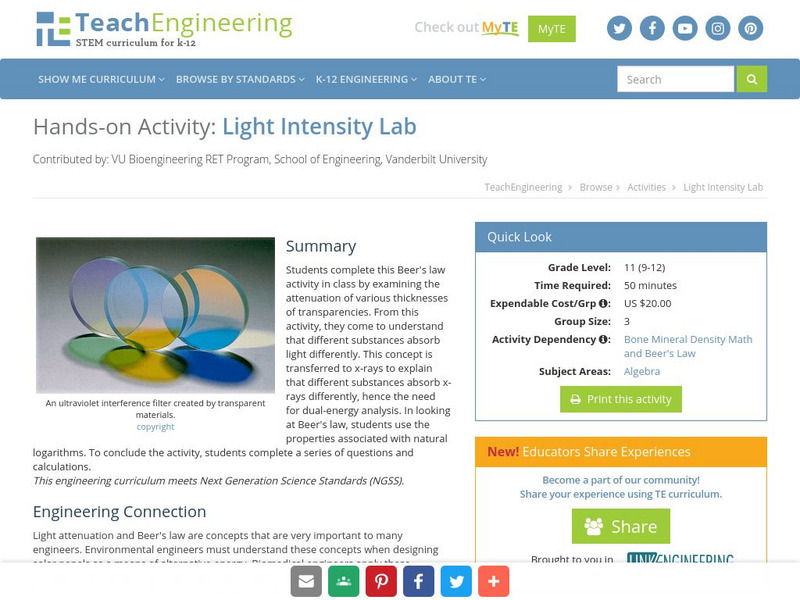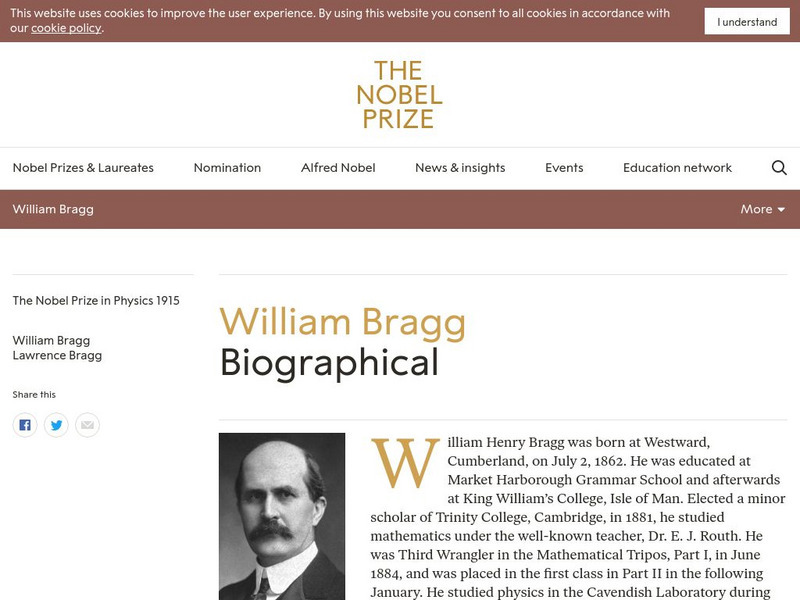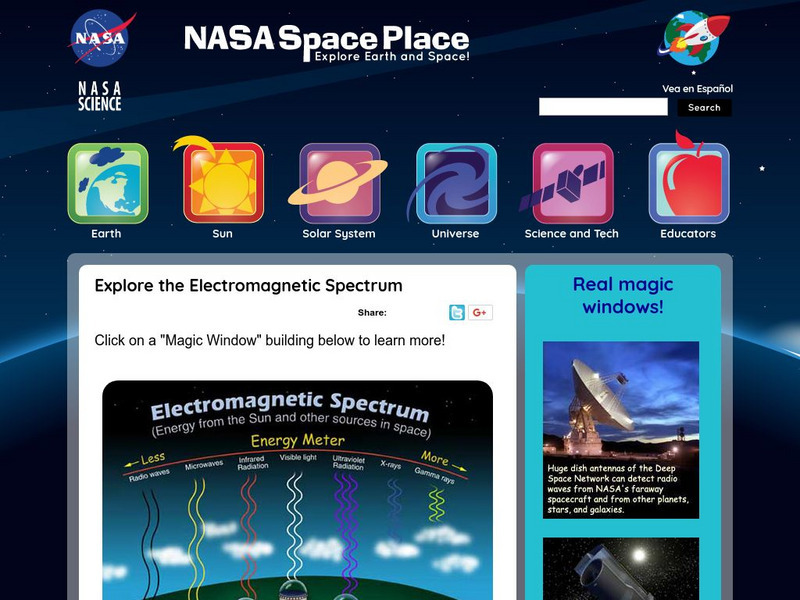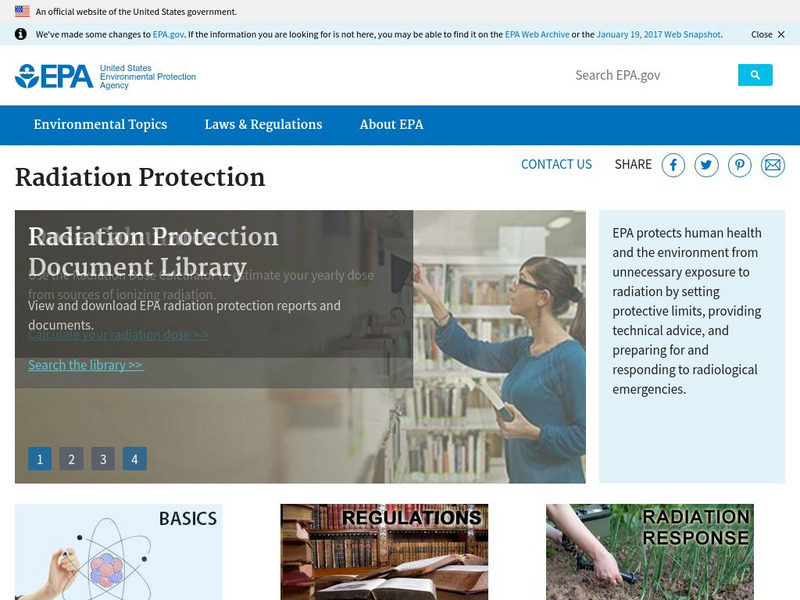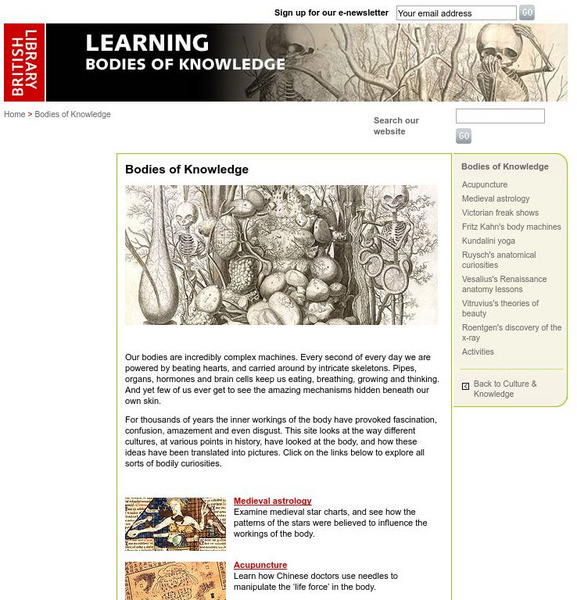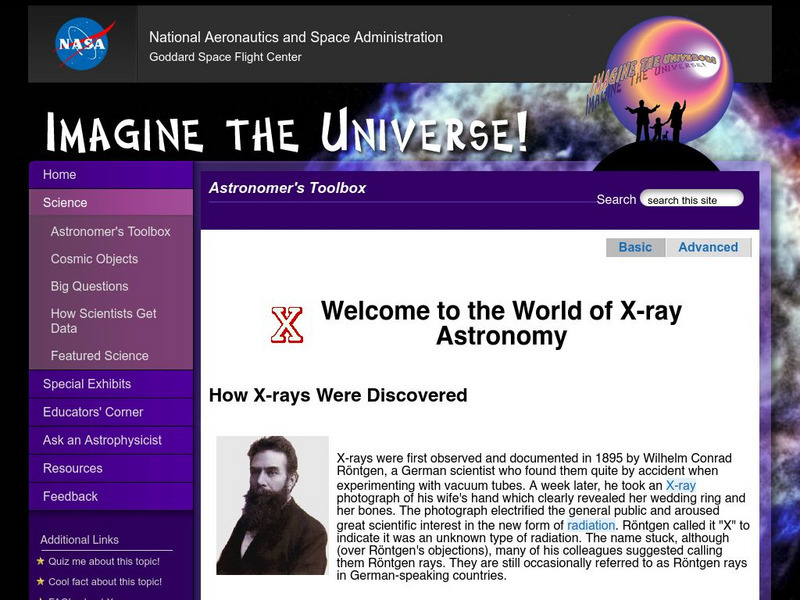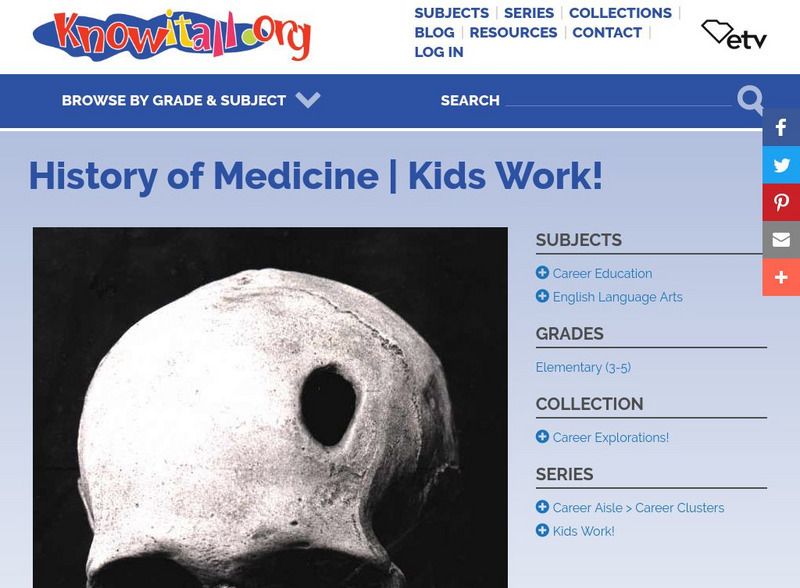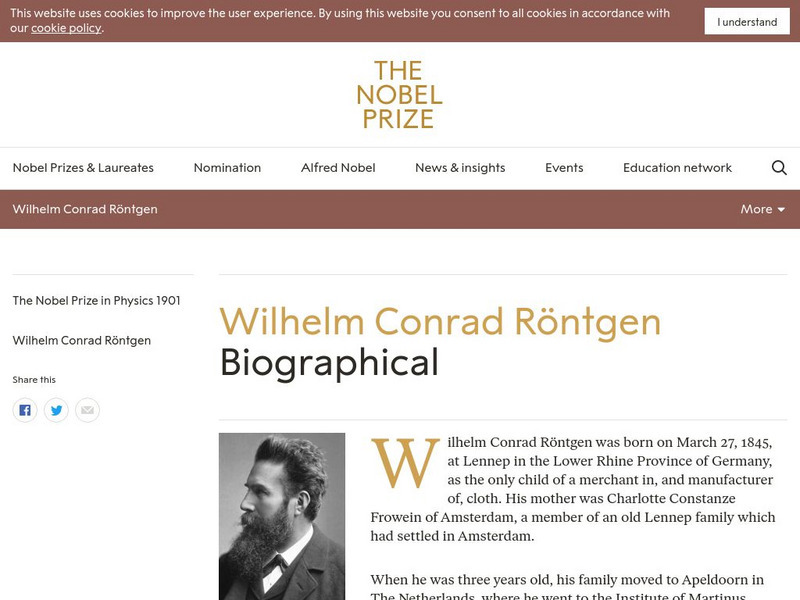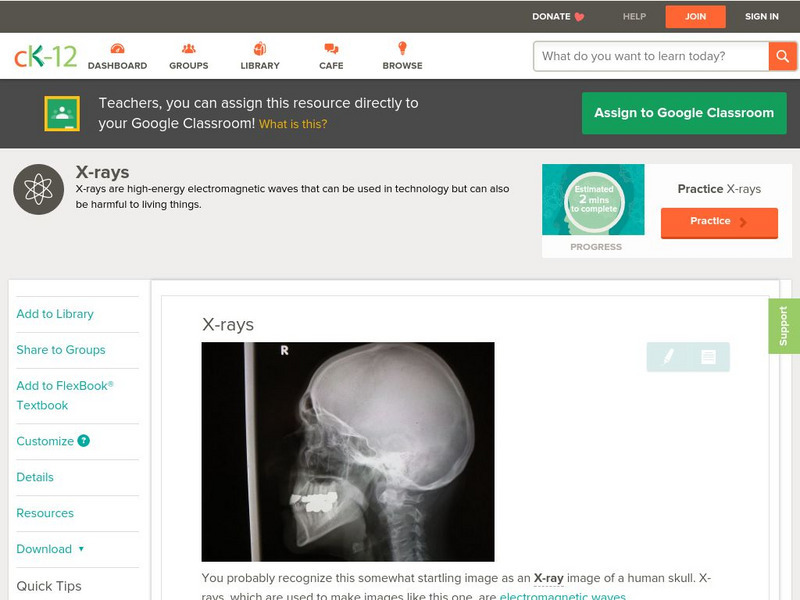Georgia Department of Education
Ga Virtual Learning: Electromagnetic Waves
Through informational text, interactive activities, practice problems, and virtual simulations, students explore the properties of electromagnetic waves.
OpenStax
Open Stax: Anatomy & Physiology: Medical Imaging
Learn here all about medical imaging, non-surgical methods to look inside the living human body.
TeachEngineering
Teach Engineering: Light Intensity Lab
Students complete this Beer's Law activity in class. Students examine the attenuation of various thicknesses of transparencies. From this activity, students will understand that different substances absorb light differently. This can...
Nobel Media AB
The Nobel Prize: William Henry Bragg Biographical
The Nobel Foundation provides a biography of Bragg. This site focuses primarily on his activities and accomplishments as a scientist.
Nobel Media AB
The Nobel Prize: Arthur Holly Compton Biographical
In addition to overviewing Compton's (1892-1962 CE) studies in x-rays, this article includes information on Compton's published works, his education, and personal life.
NASA
Nasa's the Space Place: A Trip to the Land of the Magic Windows
Explore the electromagnetic spectrum and learn about each type of energy on the spectrum.
US Environmental Protection Agency
Epa: Radiation Protection
Find out about the EPA's Radiation Protection Division, which aims to protect the nation's people and environment from harmful exposure to radiation.
University of Colorado
University of Colorado: Physics 2000: Electromagnetic Waves
Using a student-teacher dialogue format, this page discusses the nature of light as an electromagnetic wave and the electromagnetic spectrum.
University of Colorado
University of Colorado: Physics 2000: Einstein's Legacy: X Rays
An explanation of how X-ray machines work. An online activity in which a comparison is made between how the hand would be viewed with X-ray versus with visible light. An additional page explains the use of X-rays in CAT scan devices.
Nobel Media AB
The Nobel Prize: X Rays
How were x-rays discovered? How are they made? How are they used? The Nobel Foundation offers a look at the history of x-rays, including discoveries and links to related Nobel Prize winners.
British Library
British Library: Bodies of Knowledge
Series of illustrated essays on the different ways that the human body has been represented in art and science across history considers medieval astrology, the ancient Chinese practice of acupuncture, Vitruvius's notion of body symmetry,...
Other
American Institute of Physics: Marie Curie and the Science of Radioactivity
Resource provides an in-depth exhibit featuring Marie Curie and her contribution to the science of radioactivity.
Nobel Media AB
The Nobel Prize: Antoine Henri Becquerel Biographical
Read about Becquerel's (1852-1908 CE) contributions to the world of science, which earned him The 1903 Nobel Prize in Physics. This detailed biography includes important dates as well as an overview of his world with radioactivity.
Emory University
Emory University: Something About X Rays for Everybody
A summary of a century of research regarding X-rays. Discusses the discovery and applications of X-rays. Includes some ideas for exploring and investigating X-rays.
Lawrence Berkeley National Laboratory
Berkeley Lab: The E Xperiment Files
Discussion of the scientific method and the use of X-ray microscopy as an experimental technique. Explains the use of X-ray microscopy in the study of malaria.
University of California
U.c. Berkeley: Spectra From Space
View the entire spectrum of electromagnetic radiation and get information on telescopes especially designed to view different wavelengths of the spectrum.
US Department of Labor
Bureau of Labor Statistics: Medical Records and Health Information Tech
Career trends and employment projections are detailed in this Department of Labor site. General information on the Medical Records and Health Information Technician profession is also provided.
TED Talks
Ted: Ted Ed: How X Rays See Through Your Skin
Learn how x-rays were discovered, and how x-ray machines and CT scanners are able to see inside the human body. Includes a video, multiple-choice and open-ended questions, background information with links for further research, and a...
National High Magnetic Field Laboratory
Magnet Academy: Timeline of Electricity and Magnetism: 1890 1899
Scientists discover and probe x-rays and radioactivity, while inventors compete to build the first radio.
NASA
Nasa: Imagine the Universe: Welcome to the World of X Ray Astronomy
Site recounts how X-rays were discovered as well as who discovered them. Offers graphics, links to facts on this topic, a quiz, and teacher resources.
NASA
Nasa: Imagine the Universe: The History of Gamma Ray Astronomy
This NASA article discusses the history of gamma-ray astronomy. Related resources.
South Carolina Educational Television
Etv: Kids Work! History of Medicine
A brief history of medicine told in five snapshots of time: ancient times, the Middle Ages, the Renaissance, the early modern period (eighteenth and nineteenth centuries), and modern times.
Nobel Media AB
The Nobel Prize: Wilhelm Conrad Rontgen Biographical
This biographical note on Wilhelm Conrad Rontgen describes his boyhood, upbringing, education, scientific work and accomplishments. Focuses on his studies of Xrays.
CK-12 Foundation
Ck 12: Physical Science: X Rays
[Free Registration/Login may be required to access all resource tools.] X-rays and their uses, xrays as high-energy rays and their dangers.


